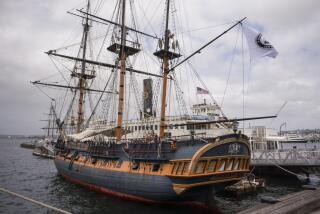Boating the Chesapeake to an Island Called Smith
- Share via
EWELL, Md. — Welcome to Smith Island, a Chesapeake Bay-bound patchwork of misty and mellow marsh. That pot of gold somewhere over the rainbow.
This group of three islands, 12 miles out in the bay west of Crisfield, Md., one-time oyster capital of the world, amounts to a blip on the high-tech radar screen. In this civilization, personal computers do not exist. Nor glossy malls, microwaves or mesquite grilling.
Even if you made off with your neighbor’s skipjack in the wee hours or stumbled around drunk down at the general store, there wouldn’t be a cop around to nail you, a jail cell to cool your heels in, or a judge to hear the case.
Smith distinguishes itself as Maryland’s one inhabited island chain accessible only by boat. What you unearth on this mellow prairie landscape is a homogeneous collection of 500 robust souls--down from 800 in recent years--linked by a common British heritage.
These Americans manage to blend the dialect of their English forebears who settled the isles with that throaty, Eastern Shore twang. It is a thoroughly curious and delightful product.
Land of the Smiths
If you hail from one of Smith’s three villages--Ewell, Tylerton or Rhodes Point--chances are that you will have a last name of Smith, Bradshaw, Tyler, Evans, Marshall or Whitelock.
Just catch a glimpse of the names inscribed on burial markers in the churchyard. They are the same ones the post office refers to when sorting and delivering mail.
Getting to Smith is a tall order. Several boats of varying size and price will get you here. One of the best in the business is Capt. Alan Tyler, a rotund chap of 50 who has been ferrying tourists to and from Smith Island from Somers Cove Marina in Crisfield for a dozen years.
He will welcome each passenger aboard his dazzling newly rebuilt paddle boat, a 70-foot affair that is the same kind used on the mighty Mississippi.
This one sports a colorful past, too. It saw service as an ammunition cargo boat in New York Harbor during World War II. Since then it’s been used as an oyster-seed hauler.
The 70-minute ride across Tangier Sound is in clean, carpeted comfort. You can buy cold drinks and crackers during the voyage and Tyler, who knows every cove and wave that laps against the barren shoreline, will only get on his public address system when he feels there is something important to say to his customers. Price: $13 round trip.
Hardy Watermen
As his pride and joy glides into the postage stamp-size dock at sleepy Rhodes Point (population 150), hardy watermen, many in ramshackle vessels, offer a brisk wave to Tyler and tourists.
These unpredictable waters they harvest promise nothing except a hard way to pay the bills. Still, a whopping 90% of Smith Islanders choose to do it this way, as generations before them had. All they desire is a chance to stay independent, free and clear of some of the traditional ties that bind the mainlanders.
Most of the natives take their Christianity seriously, reaffirming their spirituality at one of three churches along the 8-by-4-mile archipelago. From out of nowhere in the thick marsh land, there rises a weather-beaten sign. It reads: “Don’t Forget God. He Won’t Forget You.”
Virtually everyone is Methodist and their religious needs are administered by a woman minister who, each Sunday, is faced with the exhausting task of sermonizing at each of the churches.
Delicious Crab Soup
After the boat reaches Rhodes Point, you and the 90 or so other travelers amble into a plain and simple eatery called the Bayside Inn, where you are overwhelmed first with the most delicious crab soup you’ll probably ever encounter, followed by steaming platefuls of delicacies such as fried clam fritters, crab balls, ham, stewed tomatoes, corn pudding and mounds of fresh cole slaw and macaroni salad.
It’s all served by courteous, attentive young waitresses. It’s all you can eat. Cost: $8.40 per person, and well worth it. A reminder: You are not required to eat here. Feel free to brown-bag it.
The capitalistic spirit is as alive and well on Smith as it is in the shimmering towers of Dallas or the bowels of Wall Street. Take Tyler, for example. He owns the beautiful boat that whisks you to Smith. And the restaurant you chow down in, where his pretty teen-age daughter works as a waitress. And the gift shop next door, where the same daughter works as a cashier barely 15 minutes after the last lunch plate has been cleared.
Which brings us to the bus tour. You look up from your seat. Guess who’s behind the wheel? The Head Honcho of Hospitality himself.
Artesian Water
Tyler skillfully maneuvers the aging blue vehicle around miniature paths best suited for the bicycles and motor scooters that are popular here. He narrates--without the aid of a microphone--in a voice as deep and resonant as one of the seven artesian wells that supply drinking water for the island.
He rumbles past some of the green, white and yellow frame houses with laundry blowing in the bay breezes. “You can either be a Methodist or a drunk,” he intones, driving past a church with freshly mowed lawn.
“You don’t have some of the conveniences you have on the mainland,” offers Lester Tyler, 27, “but you learn to cope.” Standing amid a swampy field of crab traps and pots, Tyler--a second cousin to Alan Tyler and a devout waterman--sets the record straight on the taboo subject of drinking.
“There’s more than you might realize,” he announces, pulling hard on a cigarette. “It’s not sold on the island . . . you order it from a store on the mainland and a ferryboat will bring it. He don’t bootleg or anything like that. He just brings it as groceries.”
Somewhere inside the gloomy, gritty crab shanty sits Tommy Bradshaw, 37, polishing off a bag of potato chips. A lifelong teetotaler and a faithful churchgoer, Bradshaw is asked if he enjoys life on Smith.
“Yay-uh,” comes a reply, as he digs a little deeper to get the last few chips. He crows that he never gets bored, even though he claims he does nothing for fun. “No place like Smith Island,” summarizes this man of few words. “I’m going to stay here till I die.”
Most Nagging Problem
Smith Island, isolated though it may be, is not immune from some of the problems that befall man in this mechanical age. Perhaps the most nagging problem--and certainly the most uncharacteristic in this idyllic portrait--is one of abandoned cars and trucks. Smith has nearly as many of them as citizens, scattered like whale carcasses alongside the twisting gravel road.
This eyesore slaps you in the face like ocean spray. The islanders import the clunkers from the mainland, drive them until they crumble, and leave them where they break down.
The vehicles are used mostly to go to church, for visiting or to tote crab pots. And don’t be taken aback if you see one with 1962 tags.
Under state law, these jalopies are excused from carrying current plates, nor would many of them pass inspection for use on mainland roads.
Hope springs eternal, however. Recently, nearly $200,000 was earmarked by Somerset County to, as Alan Tyler explains, “dig a big hole and put ‘em in . . . clean up the island.”
Riding the School Boat
On the educational front, there are three schools on Smith, one in each village. But when youngsters reach ninth grade they must catch the school boat--another Alan Tyler enterprise--for the 35-minute trip to Crisfield High School.
For 30 years Sarah Bueford, 60, taught high school in Crisfield. During her tenure she imparted knowledge to platoons of Smith adolescents.
Wearing a bright red blouse, Bueford sits with outstretched legs in the ship’s pilothouse as it chugs back to Crisfield. She recalls that besides the several miles of water, not much separates kids living on the mainland from those on the island.
“Except,” she says, “they (the island group) do have an accent and they tend to remain close-knit. But they are very friendly and they want to learn. They had some very good students, but most of the time, they were just average. . . .”
This marks the second trip to Smith Island for Helen and Bert Templeton from the Allentown, Pa., area. Could she gather the muster to live here for, say, one year? “I could, but only if there was a library and a fast boat.” Declares Bert: “I could hack it for a year, yeah, but I’d need to have television.” (Which it has, including satellite receiving dishes for cable.)
Alan Tyler, Sultan of Smith Sightseeing, says that rumors of his owning half the businesses on Smith are greatly exaggerated. He then proceeds to tick off his financial interests: restaurants--both on the island and in Crisfield--an oil pier, tour bus and several boats.
It is half past 5 as the crown jewel in the Tyler fleet eases past blocks of stark seafood processing plants, the bread-and-butter pursuit on Maryland’s lower shore. As the tidy concrete pier comes into view just in front of the J. Millard Tawes Museum and Visitors Center, the ship’s mike goes on and Tyler thanks his patrons for spending the past 4 1/2 hours in his care.
After the last smiling, camera-wielding tourist descends from the boat, Tyler heads below and breaks out a couple of cold cans of beer. No, he will not return to his home on Smith tonight, but will remain in Crisfield until tomorrow afternoon at 12:30 when he will do it all over again.
Taking a long swig of suds, Tyler announces that he likes what he does. “If I didn’t, I wouldn’t do it. I meet a lot of real nice people.”
As today’s passengers plant their feet on dry land and rejoin the rhythm of life on the mainland, they file out of the behemoth parking lot all aglow.
Capt. Alan Tyler operates his paddle boat from Memorial Day through December seven days a week, depending on weather conditions. For reservations write him at Rhodes Point, Md. 21858, or phone (301) 425-2771.
More to Read
Sign up for The Wild
We’ll help you find the best places to hike, bike and run, as well as the perfect silent spots for meditation and yoga.
You may occasionally receive promotional content from the Los Angeles Times.





